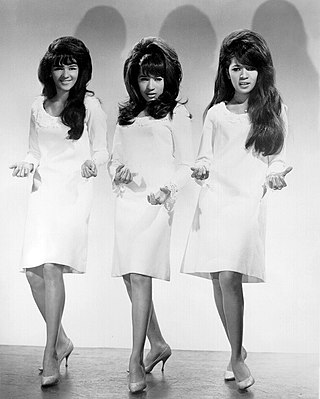
The Ronettes were an American girl group from Washington Heights, Manhattan, New York City. The group consisted of lead singer Veronica Bennett, her older sister Estelle Bennett, and their cousin Nedra Talley. They had sung together since they were teenagers, then known as "The Darling Sisters". Signed first by Colpix Records in 1961, they moved to Phil Spector's Philles Records in March 1963 and changed their name to "The Ronettes".

Edward Joseph Mahoney, known professionally as Eddie Money, was an American singer and songwriter who, in the 1970s and 1980s, had eleven Top 40 songs, including "Baby Hold On", "Two Tickets to Paradise", "Think I'm in Love", "Shakin'", "Take Me Home Tonight", "I Wanna Go Back", "Endless Nights", "Walk on Water", and "The Love in Your Eyes". Critic Neil Genzlinger of The New York Times called him a working-class rocker. In 1987, he was nominated for a Grammy Award for Best Male Rock Vocal Performance for "Take Me Home Tonight".

Darlene Wright, known professionally as Darlene Love, is an American singer and actress. She was the lead singer of the girl group the Blossoms and she also recorded as a solo artist.
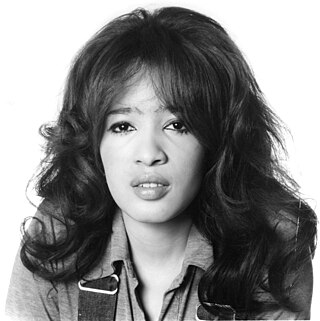
Veronica Yvette Greenfield was an American singer who co-founded and fronted the girl group The Ronettes. She is sometimes referred to as the original "bad girl of rock and roll".

Estelle Bennett was an American singer. She was a member of the girl group the Ronettes, along with her sister Ronnie and cousin Nedra Talley.
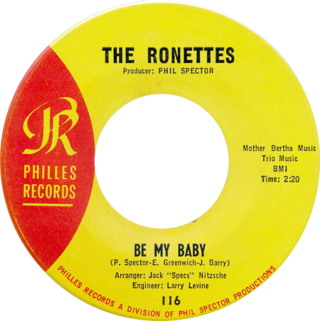
"Be My Baby" is a song by American girl group the Ronettes that was released as a single on Philles Records in August 1963. Written by Jeff Barry, Ellie Greenwich, and Phil Spector, the song was the Ronettes' biggest hit, reaching number 2 in the U.S. and number 4 in the UK. It is often ranked as among the best songs of the 1960s, and it is regarded by some as one of the greatest songs of all time.
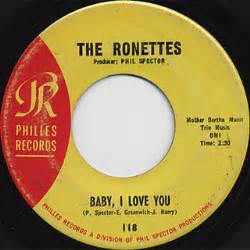
"Baby, I Love You" is a song originally recorded by the Ronettes in 1963 and released on their debut album Presenting the Fabulous Ronettes (1964). The song was written by Jeff Barry, Ellie Greenwich, and Phil Spector, and produced by Spector.

A Christmas Gift for You from Phil Spector is an album of Christmas songs, produced by Phil Spector, and originally released as Philles 4005 in November 1963. Spector treated a series of mostly secular Christmas standards to his "Wall of Sound" treatment, and the selections feature the vocal performances of Spector's regular artists during this period. One month after its release, the album peaked at No. 13 on Billboard magazine's special, year-end, weekly Christmas Albums sales chart.
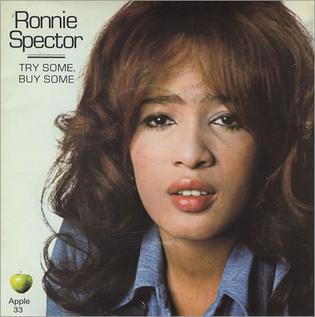
"Try Some, Buy Some" is a song written by English rock musician George Harrison that was first released in April 1971 as a single by American singer Ronnie Spector, formerly the lead vocalist of the Ronettes. She recorded it in London along with other Harrison compositions for a planned comeback album on the Beatles' Apple record label. The project was co-produced by Phil Spector, Ronnie's husband at the time, but abandoned following recording sessions that were hampered by his erratic behaviour. The only official release from the sessions, the single achieved minimal commercial success, peaking at number 77 on the US Billboard Hot 100 and number 63 on Canada's RPM Top 100. Harrison later added his own vocal onto a new mix of the instrumental track and included the song on his 1973 album Living in the Material World.
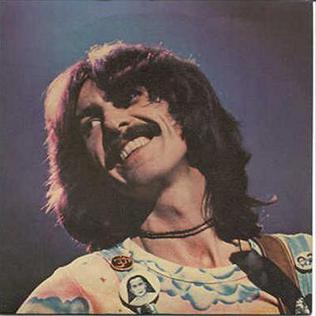
"You" is a song by English musician George Harrison, released as the opening track of his 1975 album Extra Texture . It was also the album's lead single, becoming a top 20 hit in America and reaching number 9 in Canada. A 45-second instrumental portion of the song, titled "A Bit More of You", appears on Extra Texture also, opening side two of the original LP format. Harrison wrote "You" in 1970 as a song for Ronnie Spector, formerly of the Ronettes, and wife of Harrison's All Things Must Pass co-producer Phil Spector. The composition reflects Harrison's admiration for 1960s American soul/R&B, particularly Motown.

"There Goes My Baby" is a song written by Ben E. King, Lover Patterson, George Treadwell and produced by Jerry Leiber and Mike Stoller for The Drifters. This was the first single by the second incarnation of the Drifters, who assumed the group name in 1958 after manager George Treadwell fired the remaining members of the original lineup. The Atlantic Records release was Ben E. King's debut recording as the lead singer of the group.

"Take Me Home Tonight" is a song by American rock singer Eddie Money. It was released in August 1986 as the lead single from his album Can't Hold Back. The song's chorus interpolates the Ronettes' 1963 hit "Be My Baby", with original vocalist Ronnie Spector providing uncredited vocals and reprising her role. Songwriting credit was given to Mike Leeson, Peter Vale, Ellie Greenwich, Phil Spector and Jeff Barry.
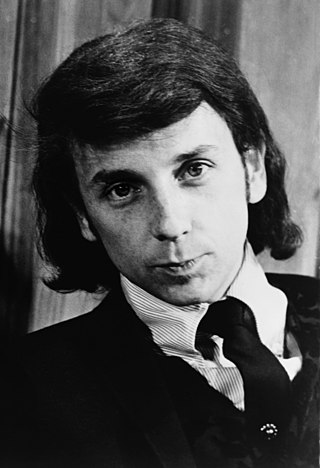
Harvey Phillip Spector was an American record producer and songwriter, best known for his innovative recording practices and entrepreneurship in the 1960s, followed decades later by his two trials and conviction for murder in the 2000s. Spector developed the Wall of Sound, a production style that is characterized for its diffusion of tone colors and dense orchestral sound, which he described as a "Wagnerian" approach to rock and roll. He is widely regarded as one of the most influential figures in pop music history and one of the most successful producers of the 1960s.

"Say Goodbye to Hollywood" is a song written and performed by Billy Joel, first released in 1976 on his album Turnstiles as its opening track. It was originally released in the United States as the B-side to "I've Loved These Days" before being re-released a month later as an A-side single with "Stop in Nevada" as the B-side. However, the song achieved greater recognition in 1981 when a live version from Songs in the Attic was released as a single, with the live version of "Summer, Highland Falls" as a B-side. Joel wrote the song after moving back to New York City in 1975; he had previously relocated to Los Angeles in 1972 in an attempt to get out of an onerous record deal. The man who represents this song on the Turnstiles album is the man wearing sunglasses and holding a suitcase.

"(The Best Part of) Breakin' Up" is a song written by Phil Spector, Pete Andreoli and Vince Poncia. It was first recorded by the Ronettes, produced by Phil Spector and arranged by Jack Nitzsche with Ronnie Spector on lead vocals and with backing vocals by Nedra Talley and Estelle Bennett, ably abetted by Darlene Love and the Blossoms, Bobby Sheen, and Sonny & Cher. The song was released in April 1964, the year widely recognized as the group's most successful year, and proved to be the group's third consecutive top forty hit in the US. The single peaked at number 39 on the U.S. Billboard Hot 100 and number 43 on the UK Singles Chart.
"Is This What I Get for Loving You?" is a pop song written by Phil Spector, Carole King and Gerry Goffin and recorded by 1960s girl group The Ronettes. The song featured Ronettes lead singer Ronnie Spector on lead vocals, and Ronettes Nedra Talley and Estelle Bennett on backing vocals. Released on Philles Records, reaching No. 75 on the Billboard Hot 100 in 1965.
This article is a discography for American singing group The Ronettes. The Ronettes began recording with Colpix Records in 1961 and recorded eleven songs for Colpix. In March 1963, the group moved to Phil Spector's Philles Records, where they achieved their biggest success.
Diamond Records was a record label, based in New York City, which was founded in 1961 by former Roulette Records executive Joe Kolsky. Another Roulette exec, Kolsky's brother Phil Kahl, joined Kolsky in the venture the following year.

Be My Baby: How I Survived Mascara, Miniskirts, and Madness, Or, My Life as a Fabulous Ronette is a memoir by Ronnie Spector co-written with Vince Waldron, which recounts her roller-coaster career as lead singer of the Ronettes and her emotionally abusive marriage to Phil Spector. A film adaptation starring Zendaya as Ronnie was announced in 2021.
The Pussywillows were a group that featured Elinor Blake, Lisa Dembling and Lisa Jenio. Their recordings have appeared on the Kill the Moonlight soundtrack, and the Rutles Highway Revisited album.
















